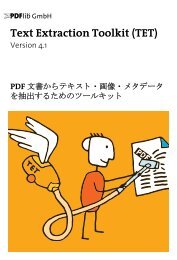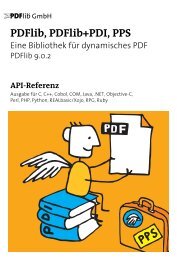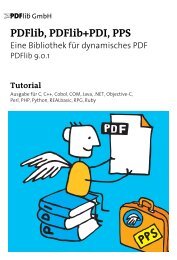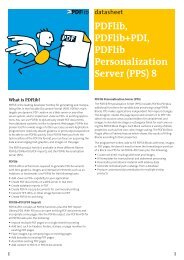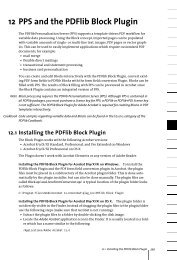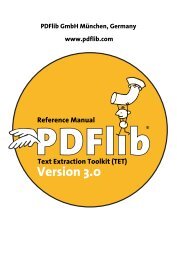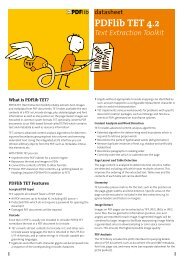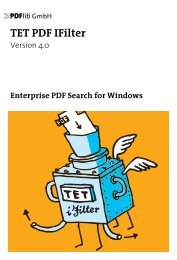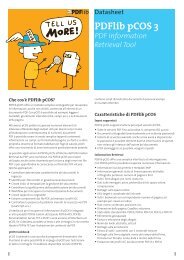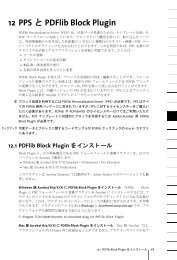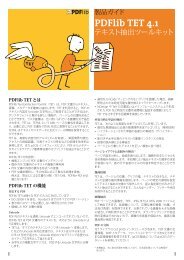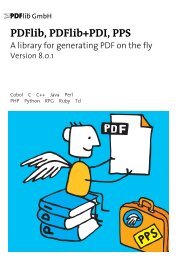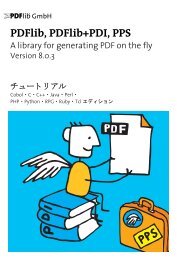PDFlib 8 Windows COM/.NET Tutorial
PDFlib 8 Windows COM/.NET Tutorial
PDFlib 8 Windows COM/.NET Tutorial
You also want an ePaper? Increase the reach of your titles
YUMPU automatically turns print PDFs into web optimized ePapers that Google loves.
5.4 Loading Fonts<br />
5.4.1 Selecting an Encoding for Text Fonts<br />
Fonts can be loaded explicitly with the load_font( ) function or implicitly by supplying<br />
the fontname and encoding options to certain functions such as add/create_textflow( ) or<br />
fill_textblock( ). Regardless of the method used for loading a font, a suitable encoding<br />
must be specified. The encoding determines<br />
> in which text formats <strong>PDFlib</strong> expects the supplied text;<br />
> which glyphs in a font can be used;<br />
> how text on the page and the glyph data in the font will be stored in the PDF output<br />
document.<br />
<strong>PDFlib</strong>’s text handling is based on the Unicode standard 1 , almost identical to ISO 10646.<br />
Since most modern development environments support the Unicode standard our goal<br />
is to make it as easy as possible to use Unicode strings for creating PDF output. However,<br />
developers who don’t work with Unicode are not required to switch their application<br />
to Unicode since legacy encodings can be used as well.<br />
The choice of encoding depends on the font, the available text data, and some programming<br />
aspects. In the remainder of this section we will provide an overview of the<br />
different classes of encodings as an aid for selecting a suitable encoding.<br />
Unicode encoding. With encoding=unicode you can pass Unicode strings to <strong>PDFlib</strong>. This<br />
encoding is supported for all font formats. Depending on the language binding in use,<br />
the Unicode string data type provided by the programming language (e.g. Java) can be<br />
used, or byte arrays containing Unicode in one of the UTF-8, UTF-16, or UTF-32 formats<br />
with little- or big-endian byte ordering (e.g. C).<br />
With encoding=unicode all glyphs in a font can be addressed; complex script shaping<br />
and OpenType layout features are supported. <strong>PDFlib</strong> checks whether the font contains a<br />
glyph for a requested Unicode value. If no glyph is available, a substitute glyph can be<br />
pulled from the same or another font (see Section 5.4.6, »Fallback Fonts«, page 139).<br />
Some font types in PDF (Type 1, Type 3, and OpenType fonts based on glyph names)<br />
support only single-byte text. However, <strong>PDFlib</strong> takes care of this situation to make sure<br />
that more than 255 different characters can be used even for these font types.<br />
The disadvantage of encoding=unicode is that text in traditional single- or multi-byte<br />
encodings (except ISO 8859-1) cannot be used.<br />
Single-byte encodings. 8-bit encodings (also called single-byte encodings) map each<br />
byte in a text string to a single character, and are thus limited to 255 different characters<br />
at a time (the value 0 is not available). This type of encoding is supported for all font formats.<br />
<strong>PDFlib</strong> checks whether the font contains glyphs which match the selected encoding.<br />
If a minimum number of usable glyphs is not reached, <strong>PDFlib</strong> will log a warning<br />
message. If no usable glyph at all for the selected encoding is available in the font, font<br />
loading will fail with the message font doesn’t support encoding. <strong>PDFlib</strong> checks whether<br />
the font contains a glyph for a requested input value. If no glyph is available, a substitute<br />
glyph can be pulled from the same or another font (see Section 5.4.6, »Fallback<br />
Fonts«, page 139).<br />
1. See www.unicode.org<br />
5.4 Loading Fonts 127



